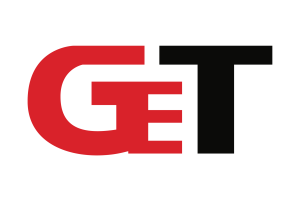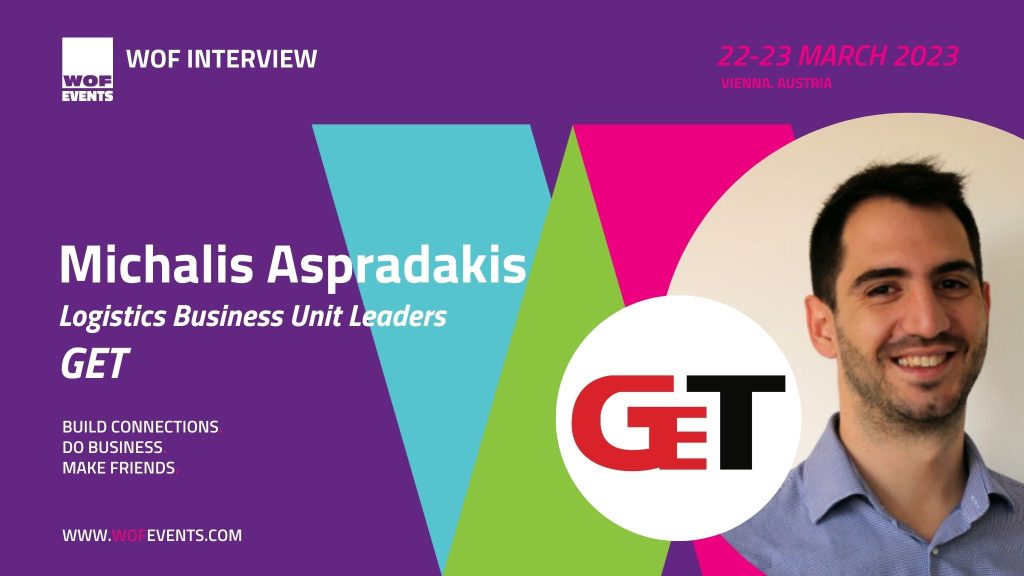Interview with Michalis Aspradakis, Logistics Business Unit Leader at GET
Michalis Aspradakis – Since his early college times, Michalis was always passionate about applying technology and engineering concepts in Supply Chain Management to build solutions that “make sense” to the end user. Fast forward to today and Michalis has been fortunate to work with major international companies in the Logistics industry, and has worked on various projects optimizing the processes in the warehouse and generally in the supply chain.
First of all, we are extremely excited that you will be a participant in this year’s WOF Summit Vienna.
The excitement is mutual! Although GET has regularly participated in conferences around the CEE region, this is the first time we are coming to WOF. We are happy that such an event exists, and we are very pleased to be a part of it.
In your opinion, what are the biggest trends in logistics at the global level?
Our current experience from working with large German 3PL and logistics companies says that the biggest trends within the logistics industry in the coming years will be eCommerce as well as automation and digitization of processes.
There are also a certain number of companies in our country that actively invest in the development and monitoring of the mentioned trends. An excellent example is the eCommerce company Ananas, better known as Amazon of the SEE region. In just one year of operation since Ananas as a service was launched, the incredible growth of online sales was achieved, which resulted in the preparation for the opening of a new warehouse as well as the introduction of new automation processes for processing a large number of orders. GET is closely cooperating with the Ananas company on the adaptation of GET WM to optimize their processes in the warehouse as much as possible and thus provide maximum support to their business in order to maximize profit and boost customer satisfaction.
How do you see the role of eCommerce in today’s ever-changing market?
The basic changes brought by eCommerce start from a different ordering structure, which then affects all processes in the warehouse, as well as procurement and transportation. Warehouses will now receive thousands of small orders per day instead of fewer larger B2B orders.
In practice, this means that warehouse management needs to be adapted to accommodate the increased movement with more appropriate picking methods such as wave picking, two (or more) step picking, and smart put-away algorithms. In addition, there are now hundreds of packages per day being prepared and shipped instead of a few pallets to a small number of customers, which complicates the packaging process and workload.
Today we often hear that users have high expectations and that user experience is the number one priority for companies. What is your position on this topic?
With new technologies, customer expectations have increased. A leading global example is certainly the company Amazon, which holds same-day or next-day delivery as a standard of its business.
To meet these high standards, warehouses need more sophisticated software to handle inventory more efficiently. However, in addition to digitization, certain organizational changes need to be made to shorten delivery times. The experience of the Covid pandemic has taught us that the procurement and delivery of stock can be significantly delayed, so warehouses have to hold an increasing number of SKUs, to have available stock to ship at all times and to be able to prepare orders without delay. Companies managed to do this by reaching the ultimate limits of available capacities. In addition, eCommerce indirectly affects other processes such as the handling of returned goods (returns) – as a consequence of the fact that the customer comes into physical contact with the product for the first time only when it arrives at his address. Due to this need, GET WM has developed special modules and processes to support warehouses that encounter a large number of requests for the return of goods.
Tell us more about GET WM and what problems you solve for customers with this product.
In conversations with our clients, three problems that they solved by implementing our solution are most often singled out. These are mainly the increased speed of training new employees, which with our solution often takes only one to two hours, as well as significantly increased productivity, where employees manage to perform required tasks faster and more efficiently. Also, clients receive a solution that fully meets their needs, primarily in the process of receiving goods, as well as their distribution and commissioning. Finally, I would like to mention the transparency of all movements of goods in the warehouse, which enables our clients to easily determine where organizational irregularities have occurred.
We know you have local and international customers using this product. What are GET WM’s biggest achievements right now?
Globally, we cooperate with several large 3PL companies from Germany, where we are involved in a very exciting project that will use GET WM for the needs of various clients in the field of eCommerce for B2C and B2B trades.
In the local market, we work on an exciting new project with a lot of automation and innovative processes – and we are pleased that we are part of building one of the biggest e-commerce companies in the SEE region.
What are GET’s plans for the development of GET WM?
We develop new functionalities and invest in the product every day. Among other things, we are currently working on predictive analytics, which we apply to predict expected returns of goods based on various parameters, as well as on new smart algorithms for grouping and processing orders.
Finally, can you tell us a little more about GET as a company? What are you currently working on? What are the plans for the future?
GET WM is currently in focus as our main product in the field of logistics. In addition, to GET WM, the company also develops other modules that work complementary or can be used independently, such as ECM (a system for service management, reporting, and incident management specialized for work in factories and warehouses) and other logistics modules (eg. Gate&Yard Management, Prepacking, Track&Trace). We also plan to release an effective and comprehensive TMS (Transport Management System) solution next year.
****** Global Engineering Technologies – GET is a Belgrade-based company founded in 2007. GET is recognized as a reliable ISV and IT outsourcing company on the international market. We specialize in software development and IT outsourcing services and we are one of the fastest-growing IT companies in SEE with SAP, Microsoft, Atlassian, Cisco partner status. GET is present at important industry IT conferences and public events in the region across Europe.
Global Engineering Technologies – GET is a Belgrade-based company founded in 2007. GET is recognized as a reliable ISV and IT outsourcing company on the international market. We specialize in software development and IT outsourcing services and we are one of the fastest-growing IT companies in SEE with SAP, Microsoft, Atlassian, Cisco partner status. GET is present at important industry IT conferences and public events in the region across Europe.

